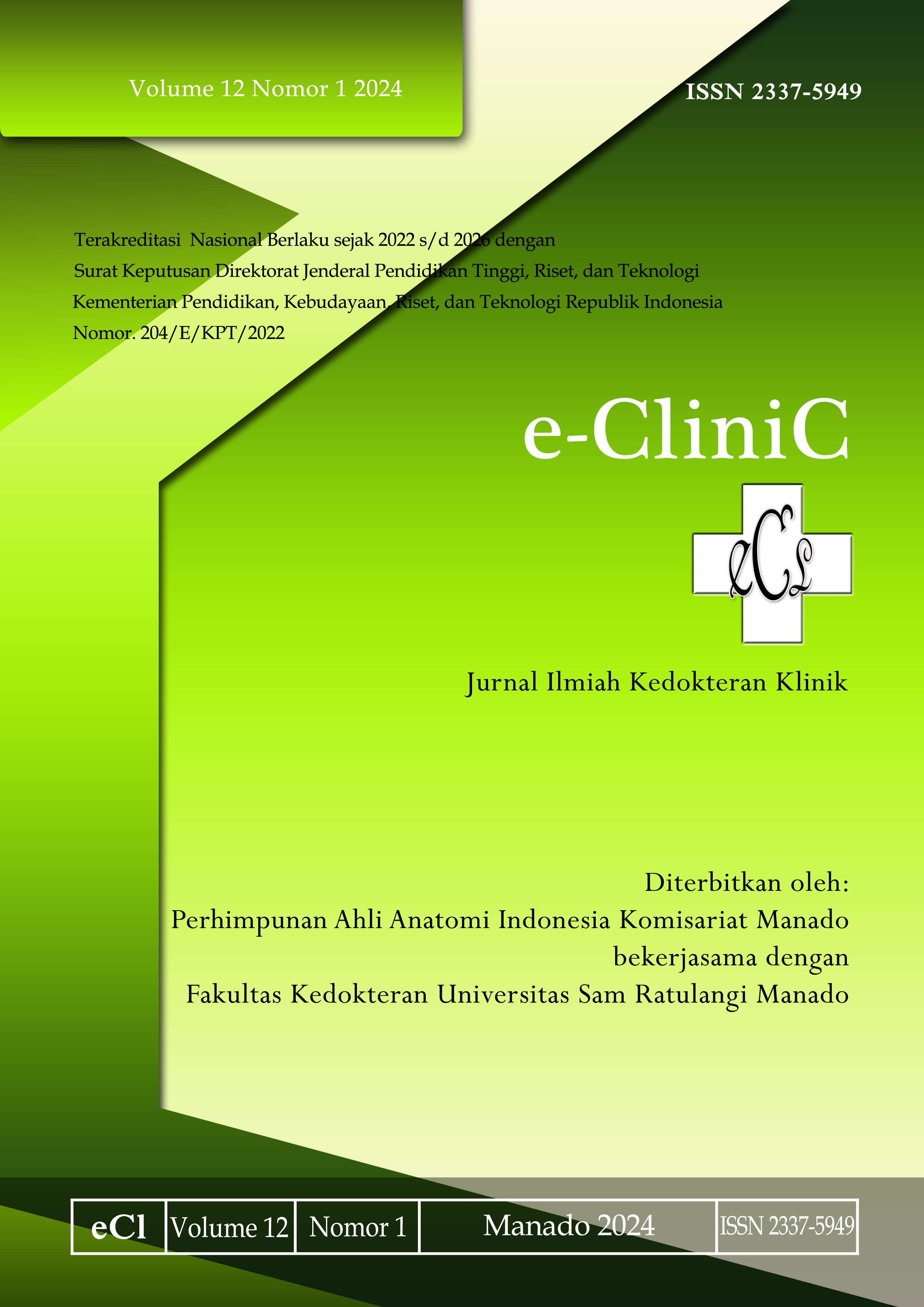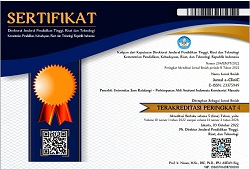Pengaruh Penggunaan Proton Pump Inhibitors (PPIs) Jangka Panjang terhadap Kanker Lambung
DOI:
https://doi.org/10.35790/ecl.v12i1.45428Abstract
Abstract: Proton pump inhibitors (PPIs) are the most commonly used group of drugs for the treatment of acid-related disorders, such as gastro-esophageal reflux disease (GERD), peptic ulcer disease (PUD), and dyspepsia. In Indonesia overall, in recent years there has been a reported increase in the use of PPIs and the associated side effects of long-term use including gastric cancer. This study aimed to determine the effect the long-term use of PPIs on the occurrence of gastric cancer. This was a literature review study. Journal searching was conducted through two online journal databases, namely, PubMed and ScienceDirect. The results obtained 11 research articles about the duration of PPIs’s use as a cause of gastric cancer. Long-term use of PPIs was associated with an increased risk of gastric cancer, which was also associated with the duration of use. Gastric cancer due to long-term use of PPIs could also occur in patients after H. pylori eradication, patients with GERD, and patients after percutaneous coronary interventions (PCI). In conclusion, long-term use of PPIs can affect the occurrence of gastric cancer.
Keywords: proton pump inhibitors; gastric cancer; long-term use of drug
Abstrak: Proton pump inhibitors (PPIs) merupakan golongan obat yang paling umum digunakan untuk pengobatan terkait gangguan yang berhubungan dengan asam lambung seperti gastro-esophageal reflux disease (GERD), peptic ulcer disease (PUD), dan dyspepsia. Di Indonesia secara keseluruhan beberapa tahun terakhir dilaporkan terjadi peningkatan penggunaan PPIs yang memunculkan efek samping terkait penggunaan jangka panjang termasuk kanker lambung. Penelitian ini bertujuan untuk mengetahui pengaruh jangka waktu penggunaan PPIs pada kejadian kanker lambung. Jenis penelitian ialah suatu literature review dengan pencarian jurnal melalui dua database journal online, yaitu PubMed dan ScienceDirect. Hasil penelitian mendapatkan 11 artikel penelitian yang memiliki informasi terkait jangka waktu penggunaan PPIs sebagai penyebab kanker lambung. Penggunaan PPIs jangka panjang berhubungan dengan peningkatan risiko kanker lambung, yang juga berhubungan dengan durasi penggunaan. Kanker lambung akibat penggunaan PPIs jangka panjang juga dapat terjadi pada pasien setelah eradikasi H. pylori, pasien dengan GERD, dan pasien setelah percutaneous coronary interventions (PCI). Simpulan penelitian ini ialah terdapat pengaruh penggunaan PPIs jangka panjang terhadap terjadinya kanker lambung.
Kata kunci: proton pump inhibitors; kanker lambung; penggunaan obat jangka panjang
References
Targownik L, Fisher D, Saini S. Aga clinical practice update on de-prescribing of proton pump inhibitors: expert review. ClinicalKey. 2022;162(4):1334-42.
Townsend C, Beauchamp R, Evers B, Mattox K. Sabiston Textbook of Surgery: The Biological Basis of Modern Surgical Practice (21st ed). Elsevier Saunders; 2022.
Haastrup PF, Jarbøl DE, Thompson W, Hansen JM, Søndergaard J, Rasmussen S. When does proton pump inhibitor treatment become long term? A scoping review. BMJ Open Gastroenterology. 2021;8(1):e000563. Doi:10.1136/bmjgast-2020-000563
Syari DM, Sari H. Evaluasi penggunaan obat proton pump inhibitor pada pasien rawat jalan dengan gangguan lambung (gastritis) di rumah. JIFI. 2021;5(1):1-4. Doi:10.52943/jifarmasi.v5i1.623
Chan F, Lau J. Peptic ulcer disease. In: Sleisenger and Fordtran’s Gastrointestinal and Liver Disease (11th ed). Elsevier; 2020. p. 806-19.
Waller D, Sampson AP. Dyspepsia, peptic ulcer disease and gastrooesophageal reflux disease. In: Medical Pharmacology and Therapeutics (6th ed). Southampton: Elsevier; 2022.
Yosela K, Elyani H, Airlangga H. Systematic literature review: pengaruh penggunaan proton pump inhibitor (PPI) jangka panjang terhadap imunitas traktus gastrointestinal. Available from: repository.unisma.ac.id/handle/123456789/1520
Kristanto A, Adiwinata R, Rasidi J, Phang BB, Adiwinata S, Richard T, et al. Long term risk of proton pump inhibitor administration: a literature review. The Indonesian Journal of Gastroenterology, Hepatology, and Digestive Endoscopy. 2017;18(3):169-76. Doi: 10.24871/1832017169-176
Joo MK, Park JJ, Chun HJ. Proton pump inhibitor: The dual role in gastric cancer. World J Gastroenterol. 2019;25(17):2058-70. Doi:10.3748/wjg.v25.i17.2058
Long-term proton pump inhibitor use and risk of gastrointestinal cancers. ClinicalKey. [cited 2022 Nov 20]. Available from: https://www.clinicalkey.com/#!/content/journal/1-s2.0-S0016508519372002
Cancer (IARC) TIA for R on. Global cancer observatory. [cited 2022 Nov 20]. Available from: https://gco.iarc.fr/
Rawla P, Barsouk A. Epidemiology of gastric cancer: global trends, risk factors and prevention. Gastroenterology Rev. 2018;14(1):26-38. Doi:10.5114/pg.2018.80001
Eusebi LH, Telese A, Marasco G, Bazzoli F, Zagari RM. Gastric cancer prevention strategies: a global perspective. J Gastroenterol Hepatol. 2020;35(9):1495-502. Doi:10.1111/jgh.15037
Lee JK, Merchant SA, Schneider JL, Jensen CD, Fireman BH, Quesenberry CP, et al. Proton pump inhibitor use and risk of gastric, colorectal, liver, and pancreatic cancers in a community-based population. Am J Gastroenterol. 2020;115(5):706-15. Doi:10.14309/ajg.0000000000000591
Hypergastrinemia: causes, definition, symptoms & treatment. Cleveland Clinic. [cited 2023 Jan 4]. Available from: https://my.clevelandclinic.org/health/diseases/23225-hypergastrinemia
Bonheur J. Gastrinoma. Published online December 3, 2021. [cited 2023 Jan 4]. Available from: https://emedicine.medscape.com/article/184332-overview
Abrahami D, McDonald EG, Schnitzer ME, Barkun AN, Suissa S, Azoulay L. Proton pump inhibitors and risk of gastric cancer: population-based cohort study. Gut. 2022;71(1):16-24. Doi:10.1136/ gutjnl-2021-325097
Seo SI, Park CH, You SC, Kim JY, Lee KJ, Kim J, et al. Association between proton pump inhibitor use and gastric cancer: a population-based cohort study using two different types of nationwide databases in Korea. Gut. 2021;70(11):2066-75. Doi:10.1136/gutjnl-2020-323845
Lai SW, Lai HC, Lin CL, Liao KF. Proton pump inhibitors and risk of gastric cancer in a case–control study. Gut. 2019;68(4):765-7. Doi:10.1136/gutjnl-2018-316371
Brusselaers N, Wahlin K, Engstrand L, Lagergren J. Maintenance therapy with proton pump inhibitors and risk of gastric cancer: a nationwide population-based cohort study in Sweden. BMJ Open. 2017;7(10):e017739. Doi:10.1136/bmjopen-2017-017739
Liu P, McMenamin ÚC, Johnston BT, Murchie P, Iversen L, Lee AJ, et al. Use of proton pump inhibitors and histamine-2 receptor antagonists and risk of gastric cancer in two population-based studies. Br J Cancer. 2020;123(2):307-15. Doi:10.1038/s41416-020-0860-4
Brusselaers N, Lagergren J, Engstrand L. Duration of use of proton pump inhibitors and the risk of gastric and oesophageal cancer. Cancer Epidemiol. 2019;62:101585. Doi:10.1016/j.canep.2019.101585
Cheung KS, Chan EW, Wong AYS, Chen L, Wong ICK, Leung WK. Long-term proton pump inhibitors and risk of gastric cancer development after treatment for Helicobacter pylori: a population-based study. Gut. 2018;67(1):28-35. Doi:10.1136/gutjnl-2017-314605
Niikura R, Hayakawa Y, Hirata Y, Yamada A, Fujishiro M, Koike K. Long-term proton pump inhibitor use is a risk factor of gastric cancer after treatment for helicobacter pylori: a retrospective cohort analysis. Gut. 2018;67(10):1908-10. Doi:10.1136/gutjnl-2017-315710
Mukkamalla SKR, Recio-Boiles A, Babiker HM. Gastric cancer. StatPearls Publishing; 2022. [cited 2022 Nov 24]. Available from: https://www.ncbi.nlm.nih.gov/books/NBK459142/
Chudri J. Kanker lambung: kenali penyebab sampai pencegahannya. Jurnal Biomedika dan Kesehatan. 2020;3(3):144-152. Doi:10.18051/JBiomedKes.2020.v3.144-152
Díaz P, Valenzuela Valderrama M, Bravo J, Quest AFG. Helicobacter pylori and gastric cancer: adaptive cellular mechanisms involved in disease progression. Front Microbiol. 2018;9:5. Doi: 10.3389/fmicb.2018.00005
Peng YC, Huang LR, Lin CL, Hsu WY, Chang CS, Yeh HZ, et al. Association between proton pump inhibitors use and risk of gastric cancer in patients with GERD. Gut. 2019;68(2):374-6. Doi:10.1136/gutjnl-2018-316057
Ng AKY, Ng PY, Ip A, Cheung KS, Siu CW. Association between proton pump inhibitors after percutaneous coronary intervention and risk of gastric cancer. BMJ Open Gastroenterol. 2021;8(1):e000719. Doi:10.1136/bmjgast-2021-000719
Downloads
Published
How to Cite
Issue
Section
License
Copyright (c) 2023 Christi D. Mambo, Anglina S. R. Masengi, Fellery W. R. Onibala

This work is licensed under a Creative Commons Attribution-NonCommercial 4.0 International License.
COPYRIGHT
Authors who publish with this journal agree to the following terms:
Authors hold their copyright and grant this journal the privilege of first publication, with the work simultaneously licensed under a Creative Commons Attribution License that permits others to impart the work with an acknowledgment of the work's origin and initial publication by this journal.
Authors can enter into separate or additional contractual arrangements for the non-exclusive distribution of the journal's published version of the work (for example, post it to an institutional repository or publish it in a book), with an acknowledgment of its underlying publication in this journal.
Authors are permitted and encouraged to post their work online (for example, in institutional repositories or on their website) as it can lead to productive exchanges, as well as earlier and greater citation of the published work (See The Effect of Open Access).







